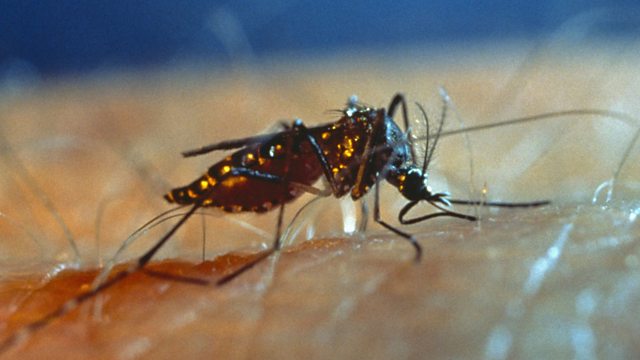
Mosquitos and Body Odour, stem cell cloning and the Most Powerful Computer
New research shows mosquitos infected with malaria become more attracted to body odour. And how stem cell cloning could help to treat human diseases and disorders.
A study published this week has revealed that malaria alters the behaviour of its mosquito host. When infected with the disease, the mosquitos became much more attracted to human body odour. The results could help us understand how malaria is transmitted and how we can prevent the spread of the disease. BBC Science Reporter Rebecca Morelle explains.
Google, NASA and the Universities Space Research Association have opened a new lab at the Ames research centre, complete with a $15 million “quantum” computer. The 512-quibit “quantum” computer will be 3,600 times faster than a conventional computer, using a D-Wave Two processor that allows it to calculate a solution to mathematical problems in a fraction of a second. D-Wave Systems’ Chief Technical Officer Dr Geordie Rose attempts to explain the physics behind the world’s most powerful computer.
On Tuesday, the Sun spouted an intense, high-energy solar flare, sending billions of tonnes of particles into space. Although some solar flares can interfere with satellites and communications, the sunspot that spawned these flares were not directly facing Earth. In the build-up to the Sun’s peak in activity, sun flares might become more common.
(Image: Close-up of mosquito)
Last on
Chapters
-
Malaria-infected mosquitoes attracted to body odour
When infected with malaria, a mosquito’s sense of smell changes
Duration: 07:00
Somatic Nuclear Transfer
Scientists have produced human embryonic stem cells using caffeine.
Duration: 05:05
Saudi Arabia’s New Breast Cancer Detection Scheme
Scheme to help detect the early stages breast cancer using portable mammography units.
Duration: 06:45
Dance Recognition
A special dance floor which can detect a person’s movements and compose music accordingly
Duration: 04:45
Solar Flares
The sun spawns its biggest solar flare of 2013, in the approach to the solar cycle peak.
Duration: 02:45
A World-Wide Biodiversity Library
Institutions are making vast data sets available to help predict environmental change.
Duration: 05:10
Hurricane Sandy
Scientists debate how to avoid a repeat of the extensive flooding after Hurricane Sandy
Duration: 11:45
Quantum Computing, 3600 times faster than a conventional computer
A “quantum” computer has been installed at NASA’s Ames research centre.
Duration: 04:04
Broadcast
- Sun 19 May 2013 14:06GMTBBC World Service Online
Podcast
-
![]()
Unexpected Elements
The news you know, the science you don't

